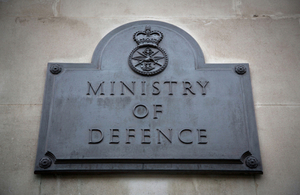
Defence Secretary Penny Mordaunt has today launched a public consultation on new measures to provide stronger legal protections for serving and former armed forces personnel from alleged historical offences.
In recent years, overseas operations have given rise to thousands of allegations of wrongdoing, most of which only emerged years after the event. These have had a significant impact on members of the armed forces and veterans who have either been the subject of criminal investigations or interviewed as witnesses. At the same time, others have been called upon to give evidence on behalf of the Ministry of Defence, which has had to deal with thousands of civil claims at a great cost to the taxpayer.
The consultation, which will be open for 12 weeks, will allow the public to share their views on new proposals to ensure that service personnel and veterans are not subjected to repeated investigations on historical operations. The proposals include:
- Creating in law a presumption that current or former personnel will not normally face prosecution for alleged offences committed in the course of duty abroad more than 10 years ago
- Creating a new partial defence to murder, which would allow the courts to recognise the operational context in which deaths occur
- Restricting the ability of the Courts to extend the time limit for bringing civil claims for personal injury and/or death
Defence Secretary Penny Mordaunt said:
If we are asking people to put their lives on the line to protect our country, we need to make sure we look after them in return.
The proposed new measures are not about making the armed forces somehow above or exempt from the law, but recognising the unique pressures faced by personnel in the field. They will also ensure that, save for exceptional cases, personnel will no longer have to live with the threat of prosecution hanging over them for many years after the alleged incident.
The consultation proposes legislating for a presumption against prosecution for alleged offences committed on operations abroad over ten years ago because the law currently does not allow for lines to be drawn under allegations with any confidence. Under this proposal, any prosecutions for offences committed over ten years ago would only be taken forward under exceptional circumstances, such as significant new evidence emerging.
It also proposes amending the law to better reflect the operational context, and the unique pressures faced by military personnel - particularly junior soldiers, who may otherwise be prosecuted for murder in relation to deaths where quick decisions were made in highly pressured situations. The proposed partial defence to murder would mean that personnel who cause death by using more force than strictly necessary for self-defence would have their conviction reduced from murder to manslaughter. In these circumstances, the requirement for the initial use of force for self-defence must still be justified.
The third proposal is to change the time limit for civil litigation. Military operations in Iraq resulted in claims being brought against the MOD on an industrial scale, with nearly 1000 claims seeking compensation for personal injury or death. The current law which provides a time limit to such cases - three years for personal injury or death and one year for human rights climates - gives the courts broad discretion to allow claims to proceed, even when they are brought many years after the limit. The MOD's proposals would restrict the court's discretion to extend the time limit to ten years, allowing a line to be drawn under claims for historical incidents overseas.
While the proposals outlined today will provide further protections to UK forces, the military will continue to operate to strict and high standards, complying with both UK and international law, including the Geneva Conventions. Any allegations of wrongdoing will continue to be investigated properly and the armed forces will continue to be held to account.
Today's consultation does not cover Northern Ireland as the MOD is feeding into the next steps of the Northern Ireland Office's work on addressing legacy issues of Northern Ireland's past. This includes contributing lessons learned from the department's experience of the Iraq Historic Allegations Team and of historical investigations into allegations from Afghanistan.






